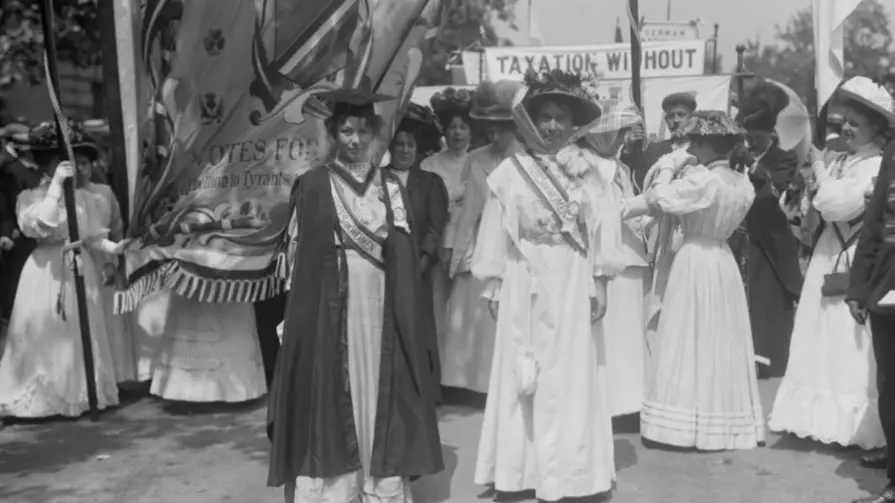
150 years ago, when a woman got married she passed her wealth and earnings on to her husband. A man could divorce his wife for adultery but not the other way around.
100 years ago women did not have the vote, even they had roles of nurses, doctors and factory hands, yet a man could have been in prison, a 'lunatic' and a slave owner and vote freely.
50 years ago the idea of women leading the way was rubbished across the vast majority of the globe.
Advert
Today, largely and thankfully, it's changed. And for the better. Some of the world's leading minds are women - look at Teresa May and Angela Merkel in politics, Indra Krishnamurthy Nooyi heading up Pepsi and Amal Clooney is a leading in human rights activist.
Sadly, that doesn't stop everyone believing it's the case - such as Janusz Korwin-Mikke.
Credit: ITV/Good Morning Britain
Advert
But enough on him.
International Women's Day helps us celebrate both past and present, but why should we need a day to admire these strong characters who've broken the mould? We should be doing this every day!
When we think of powerful women we instantly jump the well-known characters: Marie Curie, Emmeline Pankurst and Rosa Parks. Rightly so too. But what about those you don't automatically know about, or those that do the everyday so special?
The History Women
Advert
Where to start is always an issue... so let's start with a couple aforementioned.
In 1903, Marie Curie became the first woman to win a Nobel prize. She and her husband shared the accolade, before Curie won the award outright in 1911 for her work in chemistry.
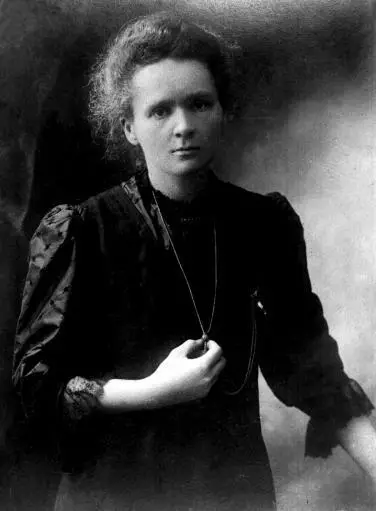
Marie Curie. Credit: PA
Advert
Her achievements started the early work of using radioactivity to target and heal tumours. Then throughout World War One she worked to develop mobile radioactive units... the modern day X-ray! Curie gave her all to science and often spoke about struggling to balance that with family life and although she is quoted to say "it's not been easy," she managed it nonetheless.
In a similar period (although part of a longer struggle), Emmeline Pankhurst helped fight for the right to vote. Let's be honest - her methods were extreme, but she did make an indelible mark on history.
Think of like this: the women's struggle had two sides. 1) The Suffragists - the peaceful lot who used petitions, non-violent demonstrations, and confronting MPs. 2) The Suffragettes - the 'actions speak louder than words' bunch. It's the second group to which Pankhurst belonged.
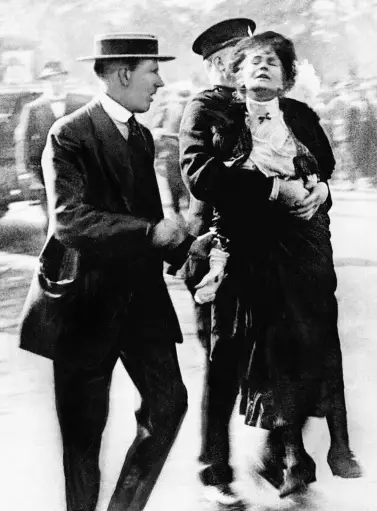
Advert
Actions speak louder than words - the motto of Emmeline Pankhurst. Credit: PA
Pankhurst led many struggles from hunger strikes, letter bombs, and loud public demonstrations. Then, during World War One, she told women to 'keep the country going' by working on farms and in factories.
It was these movements that helped the 'Representation of the People Act' get passed in 1918. This gave women over 30 the right to vote and since then it has been widened so both men and women have equal voting rights in the United Kingdom.
Rosa Parks helped to break boundaries in civil rights. In the 1950s, black people had to sit at the back of the bus, segregated. If the bus got full, white people could move the sign, and the black men and women would have to move, or stand.
Parks stood for none of it and in 1955 refused to move. Yes, she was arrested but the "first lady of civil rights" then led the Montgomery Bus Boycott. And who else was in that boycott? Mr Martin Luther King Jr - and we all know where that led to!
Eventually a United States Supreme Court decision declared the laws in place surrounding segregation were unconstitutional. If Parks had not made a stand, would we have advanced so quickly?
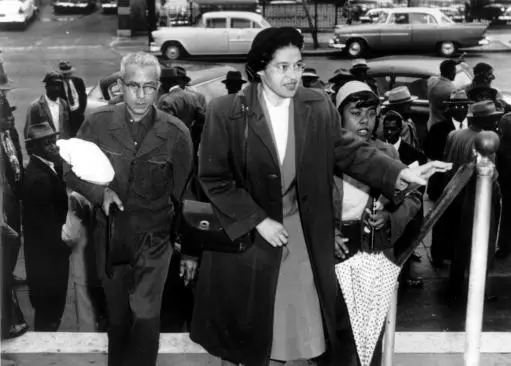
A day in court - Rosa Parks saw no reason for racial abuse. Credit: PA
Hidden Figures
Those three women are well-known with regards to women's struggles but what about the untold stories? What about the lesser known women who did a similar job?
There's a new film out that tells the remarkable story of three women in 1960s America and the Space Race...
Credit: 20th Century Fox
Hidden Figures tells the stories of Katherine Johnson, Dorothy Vaughan and Mary Jackson.
1950s America was rife with Cold War mutterings. What were Russia going to do next? Could they strike with a nuclear bomb? The Space Race was the focus to all of this. A race to get a rocket into space, followed by satellites to possibly spy on the other?
Russia won the initial race, but the fight didn't stop there. Next came a man into space (the Soviet Union first again), and then to the moon.
Within the American space programme were a group of black women working as mathematicians. Katherine, one the finest minds in the country, was asked to work within the Space Task Group. Fighting against sexism and racism, Katherine helped put the engineers back on track from failed missions, trajectories, and emergency plans. Her fine and mighty quick calculations even saw her help bring home an astronaut with a damaged capsule get back to earth safely.
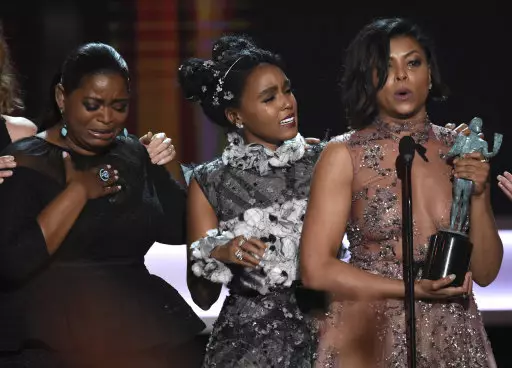
Octovia Spencer (Dorothy), Janelle Monae (Mary) and Taraji P Henson (Katherine) show the importance of women in Hidden Figures. Credit: PA
As for the other two women: Dorothy was one of the first to get to grips with the new IBM computers. Realising this was the future, Dorothy educated herself to learn code and programme the machines. She was a regular team-leader later became supervisor (another first for a black woman) and helped to train other females to stop them being replaced by machines.
And finally, Mary. Mary was sent to work as a 'computer' in the engineering department - her mind already fine enough to be an engineer - but guess what... she was a black woman too. No chance. That's until she fought the courts and won a right to gain qualifications to become NASA's first female black engineer.
It's a great tale of three women who fought so hard for their equal rights, proving that skin colour doesn't matter and creating a path for other women to follow suit.
Modern Day Heroes
So that's the past, but where are we at now? What about women of more recent times. Here we can ask Siân James and Malala Yousafzai.
If you've ever seen the film Pride then you'll be more than familiar with Siân. If you haven't - get on it!
She was instrumental in changing opinions of her local area during the miner's strike of 1984. She was a just a traditional housewife but upon contact with the support group LGSM (Lesbians and Gays Support the Miners), she campaigned for their rights in return.
After the strike ended in 1985, she became involved in women's rights campaigns and in 2005 she was elected as the first ever female MP of her South Wales Constituency - Swansea East. It's an office she ran for 10 years before stepping down.
Malala Yousafzai is a modern-day super woman - and aged only 19. She is a Pakistani activist who fought for education for girls and the empowering of women in her native Swat Valley. All this a time when the Taliban had banned girls from attending school.
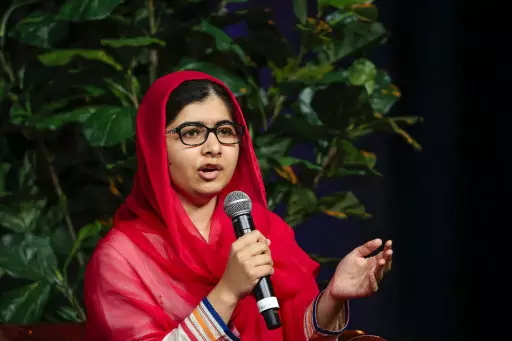
Shot, but not defeated. Malala is empowering women in the Middle-East. Credit: PA
She rose to prominence after a documentary on her, but her ascending recognition came at a price. She was shot by a gunman attempting to assassinate her. Not be defeated she survived and went on to win the Nobel Peace Prize in 2015.
Her efforts are proof to show that in this modern world there are still issues against the rights of women, but with more strong characters - who can take inspiration from the people in this article - soon equality will be a given and not a right.
It's important to remember, these women aren't just remembered for one day's work. They did it over a lifetime. And that is why we shouldn't just remember them for one day but also every day in our lifetime.
To the women of past, present and future - cheers!
But you don't have to be a well-known woman to be as inspiring. Nor do you have to do the outrageous.
What about fighting the bullies quietly and with dignity? Tanya Rybakova did that after shredding her weight down from 17 stone to just eight-and-a-half!
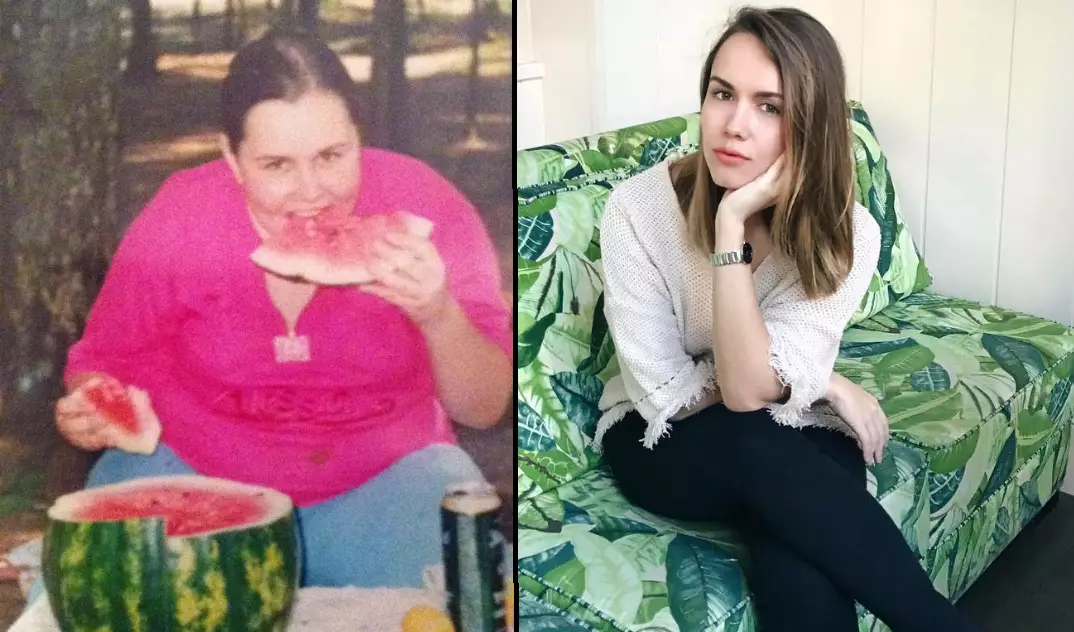
Credit: Caters
Or, by subtly doing everyday charity work. Anja Ringgren would have never wanted any attention for doing what comes naturally to her. But last year the Dane was recognised as the most inspirational woman of the year.

Featured image credit: Facebook/Anja Ringgren Lovén
Happy International Women's Day, everyone.
Featured Image Credit: PA